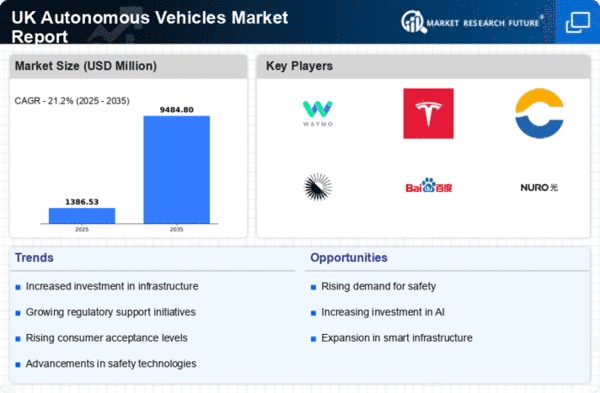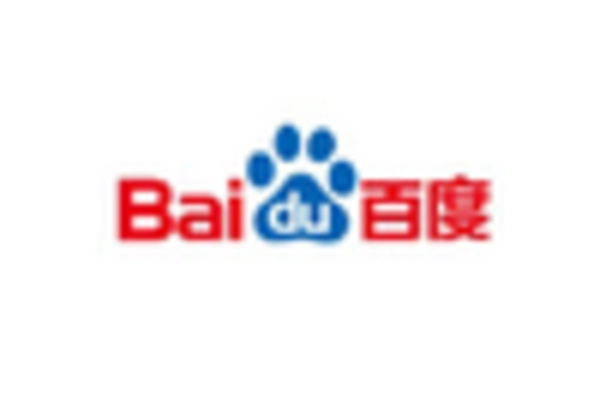Rising Demand for Safety Features
The autonomous vehicles market in the UK is experiencing a notable surge in demand for enhanced safety features. As consumers become increasingly aware of road safety statistics, which indicate that over 1,700 fatalities occur annually on UK roads, the appeal of autonomous vehicles, promising to reduce human error, becomes more pronounced.. The integration of advanced driver-assistance systems (ADAS) is a key focus. Features such as automatic emergency braking and lane-keeping assistance are gaining traction.. This shift towards prioritizing safety is likely to drive investment in the autonomous vehicles market, as manufacturers seek to meet consumer expectations and regulatory standards. Furthermore, the UK government has set ambitious targets for reducing road traffic accidents, which aligns with the capabilities of autonomous technology. Thus, the rising demand for safety features is a significant driver for the autonomous vehicles market in the UK.
Environmental Sustainability Goals
The autonomous vehicles market in the UK is increasingly aligned with the nation's environmental sustainability goals. The UK government has committed to achieving net-zero carbon emissions by 2050, which necessitates a transition to cleaner transportation solutions. Autonomous vehicles, particularly those powered by electric or alternative fuel sources, are seen as a vital component in this transition. The market for electric vehicles is projected to grow significantly, with estimates suggesting that by 2030, 70% of new car sales could be electric. This shift not only addresses environmental concerns but also aligns with consumer preferences for sustainable options. As the autonomous vehicles market evolves, The integration of eco-friendly technologies is likely to become a key driver, influencing consumer choices and regulatory policies that promote sustainability..
Government Initiatives and Funding
The autonomous vehicles market in the UK is significantly influenced by government initiatives and funding aimed at promoting innovation in transportation. The UK government has allocated substantial resources, with over £100 million dedicated to research and development in autonomous vehicle technology. This funding supports various projects, including trials and pilot programs that test the viability of autonomous systems in real-world scenarios. Additionally, the government has established regulatory frameworks to facilitate the safe integration of autonomous vehicles into existing transport systems. These initiatives not only encourage private sector investment but also foster collaboration between academia and industry. As a result, the proactive stance of the UK government is likely to accelerate advancements in the autonomous vehicles market, making it a crucial driver for growth and development in this sector.
Urbanization and Traffic Congestion
The autonomous vehicles market in the UK is being propelled by the challenges posed by urbanization and traffic congestion. With over 80% of the UK population residing in urban areas, cities are facing increasing pressure on transportation infrastructure. Traffic congestion costs the UK economy approximately £6 billion annually, highlighting the urgent need for innovative solutions. Autonomous vehicles are perceived as a potential remedy to alleviate these issues by optimizing traffic flow and reducing the number of vehicles on the road. The ability of autonomous technology to communicate with traffic management systems could lead to more efficient routing and reduced travel times. Consequently, the growing urban population and the associated traffic challenges are likely to drive the adoption of autonomous vehicles, making this a pivotal factor in the market's expansion.
Technological Integration and Connectivity
The autonomous vehicles market in the UK is being driven by advancements in technological integration and connectivity. The rise of the Internet of Things (IoT) and 5G networks is facilitating seamless communication between vehicles, infrastructure, and users. This connectivity enhances the functionality of autonomous vehicles, enabling features such as real-time traffic updates, remote diagnostics, and vehicle-to-everything (V2X) communication. As the UK invests in smart city initiatives, the potential for autonomous vehicles to integrate with urban infrastructure becomes increasingly viable. This technological synergy not only improves the user experience but also enhances safety and efficiency on the roads. Consequently, the ongoing advancements in connectivity and technology are likely to play a crucial role in shaping the future of the autonomous vehicles market in the UK.















